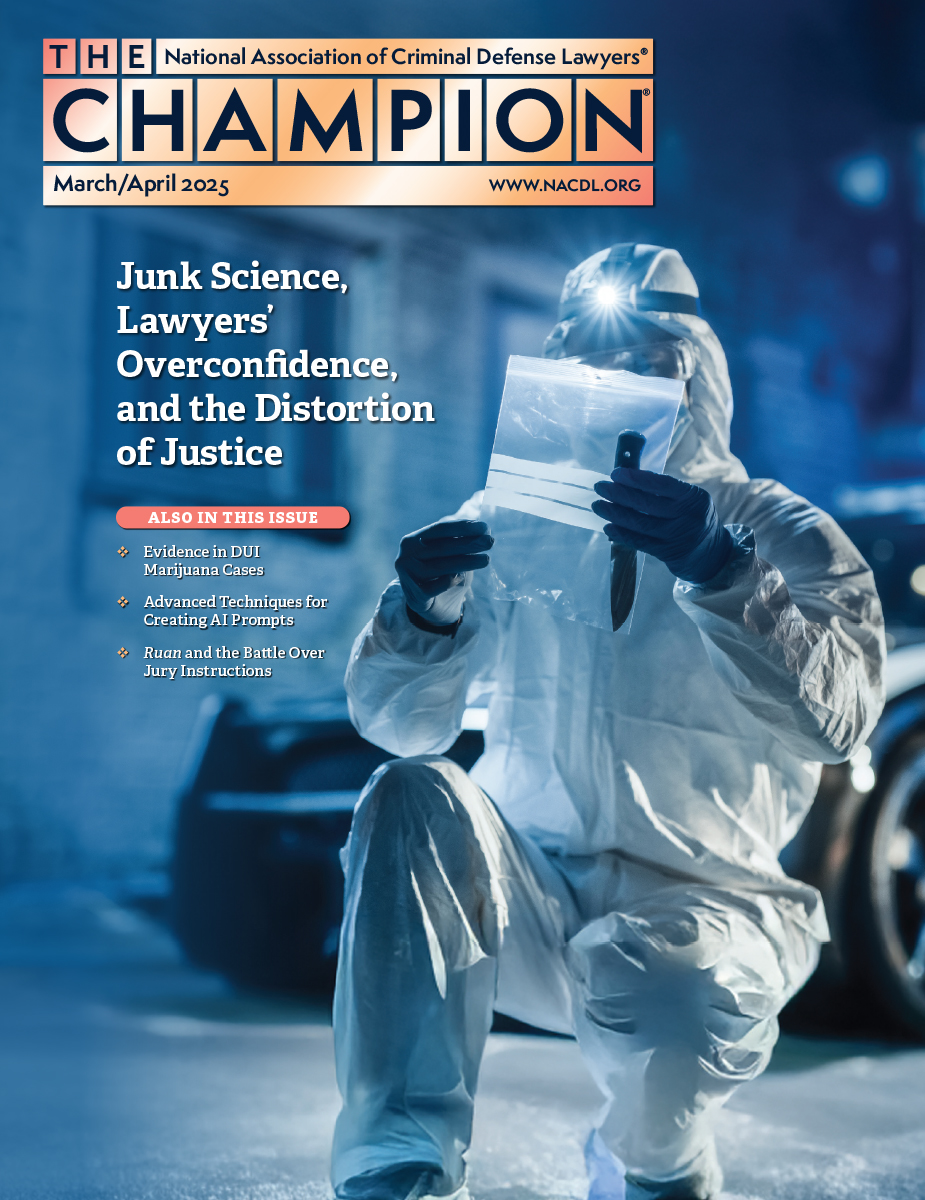Compassionate Release Motions and Decisions by Jurisdiction
Filter Results
Showing 1006 - 1020 of 1177 results
-
- Brief
United States v. Powell, 3:06CR189-RJC (W.D.N.C.)
Mr. Powell is 68 years old, has served 170 out of a 262 month sentence, and is currently on CARES Act HC. If Mr. Powell was sentenced today, he would not be designated a “career offender.” Pro bono counsel was able to work with the AUSA on this case who ultimately did not oppose the motion as long as the ECR argument was limited to the age of the defendant only, as opposed to the career offender and home confinfement issues.
Unopposed Motion (Mar. 2, 2022)
Order (Mar. 8, 2022)
-
- Brief
United States v. Barragan, 3:03CR231-GCM, Dkt. No. 771 (Feb. 25, 2022 W.D.N.C.) (CARES Act HC Grant)
Home Confinement Clearinghouse Win! Mr. Barragan is 52 years old and has completed approximately 16 years, or 75%, of his prison term. He went to trial in 2005 on marijuana conspiracy and 924(c) charges and was convicted on all counts and sentenced to 353 months, which was later reduced to 292 months. Mr. Barragan entered BOP custody on July 11, 2006 and his projected release date was September 4, 2025. On June 30, 2021, Mr. Barragan was one of the carefully selected inmates that the Bureau of Prisons transferred to home confinement pursuant to its authority under the CARES Act after determining he was a low-risk offender who did not pose a danger to the community and in light of his significant health issues. He now lives with his sister and has obtained steady employment with a significant wage in a reputable factory, and he has complied with every condition of his release.
After Mr. Barragan obtained pro bono counsel through the Clearinghouse who filed a compassionate release motion on his behalf, the court granted Mr. Barragan’s compassionate release motion finding that Mr. Barragan would be high-risk for illness or death from COVID if he were sent back to prison. Although the DOJ has rescinded the OLC Memo, the Court noted that the new memo kept open the possibility that the BOP might return individuals like Mr. Barragan back to prison. The court also rejected the government’s argument that the motion was moot b/c Mr. Barragan was on home confinement. Notably, Mr. Barragan had filed two prior cr motions—all pro se—which had been denied.
Motion (Dec. 24, 2021)
Response (Jan. 3, 2022)
Reply (Jan. 7, 2022)
Order Granting Release (Feb. 25, 2022)
-
- Brief
US v. Hernandez, 2021 WK 3192161 (C.D. Ill. July 28, 2021)
Hernandez had a great COVID argument and a great excessive sentence argument, but both were foreclosed by Seventh Circuit opinions (Broadfield and Thacker) before court could rule. Instead, district court relied on remainign issues--changing attitudes about marijuana--as the extraordinary and compelling reasons and granted a reductionto time-served.
Amended Motion (Nov. 19, 2020)
Order (July 28, 2021)
-
- Brief
United States v. Estrada-Elias, 2021 WL5505499, No. 21-5680 (6th Cir. Nov. 24, 2021)
Case started out as an excessive sentence case (the two §851s that created life mandatory mininum wouldn't apply today), but due to bad case law in Sixth Cicuit, attorney Chloe Smith smartly pivoted to more traditional/COVID arguments. After Judge Danny Reeves in the EDKY denied the motion, Chloe appealed the denial of the CR motion to the Sixth Circuit.
The Sixth Circuit reversed and remanded the district court’s denial of compassionate release to a 90-year-old, terminally ill, bedridden defendant serving mandatory life for non-violent marijuana offense that would only be subject to a 10-year mandatory minimum today. In reversing, the Sixth Circuit found that the “district court’s analysis of the 18 U.S.C § 3553(a) factors leaves us “ ‘with a definite and firm conviction that the district court committed a clear error of judgment.’ ”
By overly emphasizing Estrada-Elias’s history of nonviolent crimes, ignoring the low likelihood that Estrada-Elias will re-offend, and mischaracterizing the reality of the gap between Estrada-Elias’s present and prior convictions, the district court engaged in a substantively unreasonable balancing of the § 3553(a) factors and therefore abused its discretion.
The court reversed and remanded for Judge Reeves to make a finding on extraordinary and compelling reasons prong, which it has assumed applied without actually holding as such.
Order (6th. Nov. 24, 2021)
-
- Brief
United States v. Patel, 2:11CR20468 (E.D. Mich. Nov. 22, 2021)
Mr. Patel had been released on CARES Act Home Confinement for 17 months. Hi CR motion argued ECR existed because client will be sent back to prison, not for violating the rules of release or for committing a new crime, but because he is four months shy of qualifying for expedited clemency under the Biden clemency program. Government countered that there was no current threat of Mr. Patel being returned to prison and cited to a Law 360 article that misrepresented AG Garland's November 2, 2021 testimony before Congress. Mr. Patel countered the incorrect information in his reply. The court, however, denied relief, finding that the "argument is premature and the issue is not ripe for review."
Order (Nov. 22, 2021)
Reply (Nov. 25, 2021)
Gov. Response (Oct. 29, 2021)
Supplemental CR Motion (Oct. 8, 2021)
-
- Brief
United States v. Gregory, 07CR73-JED (N.D. Okla. Nov. 22, 2021)
Mr. Gregory was sentenced to a mandatory 32 years on two stacked 924(c)s convictions stemming from the robberies of two Oklahoma pharmacies. NACDL pro bono attorneys filed a compassionate release motion on Mr. Gregory’s behalf arguing that a reduced sentence is appropriate because, if sentenced today, Mr. Gregory’s mandatory minimum would be only 14 years. Only two after the motion was filed, the district court reduced Mr. Gregory’s sentence to time-served, finding extraordinary and compelling reasons due to his conviction at a relatively young age (26), the disparity between his sentence and those sentenced for similar crimes after the FSA, his rehabilitation efforts, and the environment he would enter upon release. The court also noted that Mr. Gregory was a victim of drug addiction, which motivated the robberies: “While the Court obviously does not excuse what he did, there is no doubt that Mr. Gregory, like so many others in this country, was, at least in part, a victim of his addiction to opioid pain killers. This addiction was the main force that drove him to rob two pharmacies at gunpoint.” Due to the work of his pro bono attorneys, Mr. Gregory was able to spend his first Thanksgiving in 15 years at home with his family.
Order (Nov. 22, 2021)
Motion (Nov. 8, 2021)
-
- Brief
United States v. Richardson, 2:06CR10 (W.D.N.C. Oct. 29, 2021).
At the age of 25, Mr. Richardson and others committed several bank robberies. Mr. Richardson was convicted of two bank robbery offenses and two § 924(c) offenses resulting in a combined sentence of 405 months, or almost 34 years prison. Due to the First Step Acts changes in the § 924(c) stacking provision, were he sentenced today, Mr. Richardson would likely receive only a 189-month sentence. In its Order, the Court noted that Mr. Richardson had served more than 210 months in prison, where he had successfully completed numerous education programs and work assignments. The court also relied on Mr. Richardson’s lack of a serious criminal history, relative youth at the time of his offenses, his release plan to a stable home, and the 18-year disparity between the § 924(c) sentence he originally received and the sentence he would receive today. The court then reduced Mr. Richardson’s sentence from 405 months to time-served plus 14 days. Instead of a release date of 2035, Mr. Richardson will soon be home with his family.
Motion (June 23, 2021)
Goverment Response (Aug. 12, 2021)
Reply (Aug. 27, 2021)
Notice of Supplemental Authority (Oct. 14, 2021)
Order Granting Release (Oct. 29, 2021)
-
- Brief
United States v. Jarvis, 999 F.3d 442 (6th Cir. 2021)
Jarvis panel announces that despiteprevious contrary ruling in Owens, district courts cannot consider non-retroactive changes in the law, “whether by themselves or together with other factors, as “extraordinary and compelling” explanations for a sentencing reduction,” citing Tomes. The opinion tries to dance around Owens, noting that “district courts may consider the non-retroactive First Step Act amendments in applying the § 3553(a) factors once an inmate has met the threshold requirements for relief under the compassionate release statute.” Judge Clay issues a vigorous dissent. Doug Berman has more here.
-
- Brief
United States v. Gonzalez, 1:16CR162 (D. N.H. Aug. 31, 2021)
Defendant was subjected to 20-year man min based on 851 enhancement late in case--a year after indictment-- pursuant to pursuant to then-AG Sessions’ new charging policy; “[w]hen Gonzalez’s sentence is compared to the sentences received by his co-conspirators, it is apparent that he received a disproportionately harsh sentence.” CR motion granted, with the court opting to hold a new sentencing hearing.
Order (Aug. 31, 2021)
Motion (Feb. 26, 2021)
-
- Brief
United States v. Rucker, No. 04-20150-JWL, 2021 WL 4061615, at *1 (D. Kan. Sept. 7, 2021)
Reducing sentence for defendant with a 2041 release date to time-served for a combination of reasons: a newly diagnosed serious cardiac condition with poor stats for 5-year survival, 924(c) unstacking, recent cooperation, and COVID risk. Also a post-vaccination COVID grant (although the vaccination status is only mentioned in the motions). Notably, this case is a lesson in persistence. The counsel or record filed, lost, appealed, won post-Maumau, got an expert, re-filed in the district court, briefed it all some more, and voila—the client is home)
Order (Sept. 7, 2021)
-
- Brief
United States v Chandler, 5:99-cr-40044-HLT (D. Kan Aug. 27, 2021)
(joint agreement with government, notable because the sentencing change in this case was the removal of the recency criminal-history point from the guidelines, which had moved defendant up a criminal history category; also includes a section 404/crack retro argument because he was eligible, and argued the GL change there too. He had also served a long time and had good equities, and that guideline hook was enough to get some traction. Second look: not just for statutory changes.”
Motion (Aug. 26, 2021)
Order (Aug. 27, 2021)
-
- Brief
Individuals on CARES Act HC Charged With Technical Violations
United States v. Rojas, 13CR528 (D. Md)
Client was driving home from class when Hurricane Ida struck and was rerouted due to road closures and became stuck on side of the road. Called case manager before phone died and was eventually towed home. He called the halfway house the next day. The halfway house violated him, and he was given a hearing, and ultimately remanded to jail where he is now awaiting designation to a BOP facility. Court granted compassionate release
Emergency Motion (Sept. 30, 2021)
Reply (Nov. 15, 2021)
Order (Nov. 15, 2021)
U.S. v. Levi,8:04-cr-00235-DKC (D. Md. July 6, 2021)
Gwen Levi, a 76 year old grandmother released on CARES Act home confinement, was ordered back to prison when she missed a call from her supervising officials while attending a computer skills class. See "A grandmother didn’t answer her phone during a class. She was sent back to prison." (WaPo, Jun. 26, 2021).
Gwen's story has a happy ending, because Judge Deborah Chasanow granted her pending compassionate release motion, finding that due to Ms. Levi's "potential return to full custody," a reduction in sentence was appropriate. "Woman who was arrested after missing officials' phone call while in computer class is headed home." (USA Today, Jul. 6, 2021). Gwen is home!!
Motion (Second Supplement) (May 13, 2021)
Defense Counsel Status Update (June 24, 2021)
Motion for Emegency Status Hearing (July 2, 2021)
Opinion (July 6, 2021)











